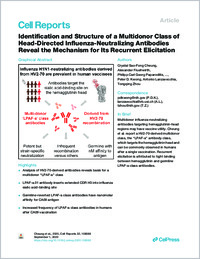Identification and structure of a multidonor class of head-directed influenza-neutralizing antibodies reveal the mechanism for its recurrent elicitation
- Sao-Fong Cheung, Crystal Vaccine Research Center, National Institute of Allergy and Infectious Diseases, National Institutes of Health, Bethesda, USA
- Fruehwirth, Alexander Institute for Research in Biomedicine (IRB), Faculty of Biomedical Sciences, Università della Svizzera italiana, Switzerland
- Paparoditis, Philipp Carl Georg Institute for Research in Biomedicine (IRB), Faculty of Biomedical Sciences, Università della Svizzera italiana, Switzerland
- Shen, Chen-Hsiang Vaccine Research Center, National Institute of Allergy and Infectious Diseases, National Institutes of Health, Bethesda, USA
- Foglierini, Mathilde Institute for Research in Biomedicine (IRB), Faculty of Biomedical Sciences, Università della Svizzera italiana, Switzerland
- Joyce, M. Gordon Vaccine Research Center, National Institute of Allergy and Infectious Diseases, National Institutes of Health, Bethesda, USA
- Leung, Kwanyee Vaccine Research Center, National Institute of Allergy and Infectious Diseases, National Institutes of Health, Bethesda, USA
- Piccoli, Luca Institute for Research in Biomedicine (IRB), Faculty of Biomedical Sciences, Università della Svizzera italiana, Switzerland
- Rawi, Reda Vaccine Research Center, National Institute of Allergy and Infectious Diseases, National Institutes of Health, Bethesda, USA
- Silacci-Fregni, Chiara Institute for Research in Biomedicine (IRB), Faculty of Biomedical Sciences, Università della Svizzera italiana, Switzerland
- Tsybovsky, Yaroslav Electron Microscopy Laboratory, Cancer Research Technology Program, Leidos Biomedical Research, Inc., Frederick National Laboratory for Cancer Research, USA
- Verardi, Raffaello Vaccine Research Center, National Institute of Allergy and Infectious Diseases, National Institutes of Health, Bethesda, USA
- Wang, Lingshu Vaccine Research Center, National Institute of Allergy and Infectious Diseases, National Institutes of Health, Bethesda, USA
- Wang, Shuishu Vaccine Research Center, National Institute of Allergy and Infectious Diseases, National Institutes of Health, Bethesda, USA
- Yang, Eun Sung Vaccine Research Center, National Institute of Allergy and Infectious Diseases, National Institutes of Health, Bethesda, USA
- Zhang, Baoshan Vaccine Research Center, National Institute of Allergy and Infectious Diseases, National Institutes of Health, Bethesda, USA
- Zhang, Yi Vaccine Research Center, National Institute of Allergy and Infectious Diseases, National Institutes of Health, Bethesda, USA
- Chuang, Gwo-Yu Vaccine Research Center, National Institute of Allergy and Infectious Diseases, National Institutes of Health, Bethesda, USA
- Corti, Davide Institute for Research in Biomedicine (IRB), Faculty of Biomedical Sciences, Università della Svizzera italiana, Switzerland
- Mascola, John R. Vaccine Research Center, National Institute of Allergy and Infectious Diseases, National Institutes of Health, Bethesda, USA
- Shapiro, Lawrence Zuckerman Mind Brain Behavior Institute, Columbia University, New York, USA - Department of Biochemistry and Molecular Biophysics, Columbia University, New York, USA
- Kwong, Peter D. Vaccine Research Center, National Institute of Allergy and Infectious Diseases, National Institutes of Health, Bethesda, USA - Department of Biochemistry and Molecular Biophysics, Columbia University, New York, USA
- Lanzavecchia, Antonio Institute for Research in Biomedicine (IRB), Faculty of Biomedical Sciences, Università della Svizzera italiana, Switzerland
- Zhou, Tongqing Vaccine Research Center, National Institute of Allergy and Infectious Diseases, National Institutes of Health, Bethesda, USA
-
01.09.2020
Published in:
- Cell reports. - 2020, vol. 32, no. 9, p. 12 p
Influenza
Hemagglutinin
Multidonor antibody class
Sialic acid-binding site
Neutralizing antibodies
Germline-reverted
X-ray crystal structure
Recurrent elication
Elicitation frequency
Vaccination
English
Multidonor antibodies are of interest for vaccine design because they can in principle be elicited in the general population by a common set of immunogens. For influenza, multidonor antibodies have been observed against the hemagglutinin (HA) stem, but not the immunodominant HA head. Here, we identify and characterize a multidonor antibody class (LPAF-a class) targeting the HA head. This class exhibits potent viral entry inhibition against H1N1 A/California/04/2009 (CA09) virus. LPAF-a class antibodies derive from the HV2-70 gene and contain a “Tyr-Gly-Asp”-motif, which occludes the HA-sialic acid binding site as revealed by a co-crystal structure with HA. Both germline-reverted and mature LPAF antibodies potently neutralize CA09 virus and have nanomolar affinities for CA09 HA. Moreover, increased frequencies for LPFA-a class antibodies are observed in humans after a single vaccination. Overall, this work highlights the identification of a multidonor class of head-directed influenza-neutralizing antibodies and delineates the mechanism of their recurrent elicitation in humans.
- Language
-
- English
- Classification
- Medicine
- License
- Open access status
- gold
- Identifiers
-
- RERO DOC 329938
- DOI 10.1016/j.celrep.2020.108088
- ARK ark:/12658/srd1319378
- Persistent URL
- https://n2t.net/ark:/12658/srd1319378
Statistics
Document views: 235
File downloads:
- Fulltext: 308
